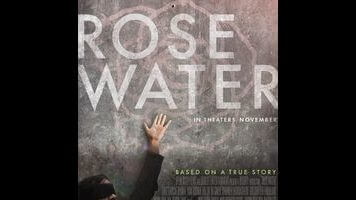The problem with most slogan flicks—movies that try to get their audience all heated up about an issue—is that they’re meant to be easily digestible, which politics rarely are. Cut out popular appeal altogether, and you end up with one of those little, airtight dialectical materialist boxes, which are pretty much unimpeachable in terms of political form, but which the average viewer doesn’t want to get into. Overdo it, and you end up with centrist mush—basic, boilerplate human-interest stuff that’s too shapeless to completely work as drama, and too depoliticized to be taken seriously as anything else. In other words, a movie like Rosewater.
The media hook for Rosewater is that it’s directed by likable television person Jon Stewart, host of The Daily Show, and that it’s based on an incident in which The Daily Show was indirectly involved. (Technically, it’s based on a memoir about an incident in which The Daily Show was indirectly involved.) What that translates to, in entertainment-section-ese, is the movie equivalent of a special segment, with Stewart—whose direct-to-camera sighs and rants are animated by a liberal idealism whose sincerity is damn near unquestionable—doffing his usual suit-and-tie combo in favor of the T-shirt-and-headphones uniform of the modern movie director to bring, share, or possibly present a timely, urgent, or maybe even relevant true-life story.
All well and good—and, again, damn near unquestionably sincere—except that Rosewater isn’t much of a film. The incident in question—the one that indirectly involved The Daily Show—is the Iranian government’s imprisonment of a journalist named Maziar Bahari (Gael García Bernal), who was taken in for questioning while covering the 2009 post-election protests for Newsweek, and only released four months later, after he’d gone on state TV to publicly confess to being an agitator and Western spy. (Among the evidence presented against him was a satirical segment taped for Stewart’s program.) This whole imbroglio isn’t laid out or examined in any particularly meaningful way, and, in fact, it could be argued that Rosewater’s offhand treatment of Bahari’s breakdown—which is positioned as an absurd response to an absurd situation—negates the movie’s big talking points. Could be is the operative phrase there, because said talking points—about repressive governments and the need to protect journalists—aren’t all that cogent to begin with.
Rosewater doesn’t have a whole lot in the way of style. Filmed in a handful of completely anonymous locations in Jordan, the Old West studio backlot of the Middle East, it’s the kind of movie where everyone speaks English with a slightly different accent (the cast is a veritable United Nations of people who aren’t actually Persian) and every dusty exterior is shot through a coral filter. It’s a movie that communicates with its viewer through lame devices and sappy cues: flashbacks that start with a flash of white and a whoosh; sequences that visualize Bahari’s memories and the importance of social media using digitally composited images and hashtags, which look exactly like smartphone commercials; awkward cutaways to footage of the real protests.
So much of Rosewater is bathetic and schmaltzy—complete with a ghost to visit and inspire Bahari in prison—that it almost comes as a surprise when it puts Bahari face-to-face with his nameless interrogator (Kim Bodnia) and becomes, if only for a few scenes, an honest-to-God movie. There’s nothing especially revealing about these sequences, which ultimately boil down to a handful of cut-rate truisms about how the repressors are themselves sexually or emotionally repressed and how shadowy governments will believe the most far-fetched conspiracy theories. However, they hint at the political black comedy that could have been.

 Keep scrolling for more great stories.
Keep scrolling for more great stories.
